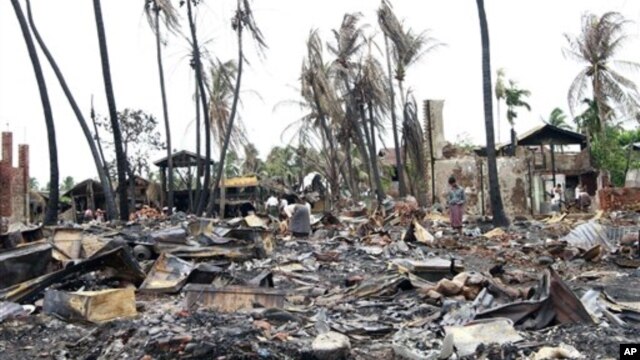 This picture, taken by North Korea’s official Korean Central News Agency on July 30, 2012 shows houses being flooded at Anju city in South Phongan province, caused by typhoon and downpour.
This picture, taken by North Korea’s official Korean Central News Agency on July 30, 2012 shows houses being flooded at Anju city in South Phongan province, caused by typhoon and downpour.
ANJU: UN staff planned to visit storm-pounded counties in North Korea on Tuesday, after two days of heavy rain submerged buildings, cut off power, flooded rice paddies and forced people and their livestock to climb onto rooftops for safety
The rain Sunday and Monday followed downpours earlier this month that killed nearly 90 people and left more than 60,000 homeless, officials said.
The floods also come on the heels of a severe drought, fueling renewed food worries about a country that already struggles to feed its people.
Two-thirds of North Korea’s 24 million people face chronic food shortages, a UN report said last month, while asking donors for $198 million in humanitarian aid for the country. South Korean analyst Kwon Tae-jin said the recent flooding, coming so soon after the dry spell, is likely to worsen the North’s food problems.
North Korea-based United Nations staff will visit the two hardest-hit counties to see what help the UN team in the country might provide, Christopher de Bono, Unicef’s chief of communications for East Asia and the Pacific, said Tuesday.
He had no other details.
On Sunday and Monday, rain hit the capital, Pyongyang, and other regions, with western coastal areas reporting heavy damage.
In Anju city in South Phyongan province, officials reported 1,000 houses and buildings were destroyed and 2,300 hectares of farmland were completely covered.
The Chongchon River in Anju city flooded on Monday, cutting communication lines and submerging rice paddies and other fields, said Kim Kwang Dok, vice chairman of the Anju City People’s Committee, who told The Associated Press that the disaster is the worst in the city’s history.
Boats made their way through the muddy water that covered the city’s streets Monday. Many residents sat on their homes’ roofs and walls, watching the rising water.
A young man wearing only underwear stood on a building’s roof with two pigs; four women sat on another rooftop with two dogs.
Helicopters flew to various areas to rescue flood victims, state media reported.
Casualties from the latest rains were not immediately reported.
If it rains again before the water drains, the damage will be greater, Kim said.
Earlier this year, North Korea mobilized soldiers and workers to pour buckets of water on parched fields, irrigate farms and repair wells as what officials described as the worst dry spell in a century gripped parts of both North and South Korea.
North Korea does not produce enough food to feed its people, and relies on limited purchases of food as well as outside donations to make up the shortfall. It also suffered a famine in the mid- and late 1990s, the FAO and World Food Program said in a special report late last year.
The rain Sunday and Monday followed downpours earlier this month that killed nearly 90 people and left more than 60,000 homeless, officials said.
The floods also come on the heels of a severe drought, fueling renewed food worries about a country that already struggles to feed its people.
Two-thirds of North Korea’s 24 million people face chronic food shortages, a UN report said last month, while asking donors for $198 million in humanitarian aid for the country. South Korean analyst Kwon Tae-jin said the recent flooding, coming so soon after the dry spell, is likely to worsen the North’s food problems.
North Korea-based United Nations staff will visit the two hardest-hit counties to see what help the UN team in the country might provide, Christopher de Bono, Unicef’s chief of communications for East Asia and the Pacific, said Tuesday.
He had no other details.
On Sunday and Monday, rain hit the capital, Pyongyang, and other regions, with western coastal areas reporting heavy damage.
In Anju city in South Phyongan province, officials reported 1,000 houses and buildings were destroyed and 2,300 hectares of farmland were completely covered.
The Chongchon River in Anju city flooded on Monday, cutting communication lines and submerging rice paddies and other fields, said Kim Kwang Dok, vice chairman of the Anju City People’s Committee, who told The Associated Press that the disaster is the worst in the city’s history.
Boats made their way through the muddy water that covered the city’s streets Monday. Many residents sat on their homes’ roofs and walls, watching the rising water.
A young man wearing only underwear stood on a building’s roof with two pigs; four women sat on another rooftop with two dogs.
Helicopters flew to various areas to rescue flood victims, state media reported.
Casualties from the latest rains were not immediately reported.
If it rains again before the water drains, the damage will be greater, Kim said.
Earlier this year, North Korea mobilized soldiers and workers to pour buckets of water on parched fields, irrigate farms and repair wells as what officials described as the worst dry spell in a century gripped parts of both North and South Korea.
North Korea does not produce enough food to feed its people, and relies on limited purchases of food as well as outside donations to make up the shortfall. It also suffered a famine in the mid- and late 1990s, the FAO and World Food Program said in a special report late last year.





